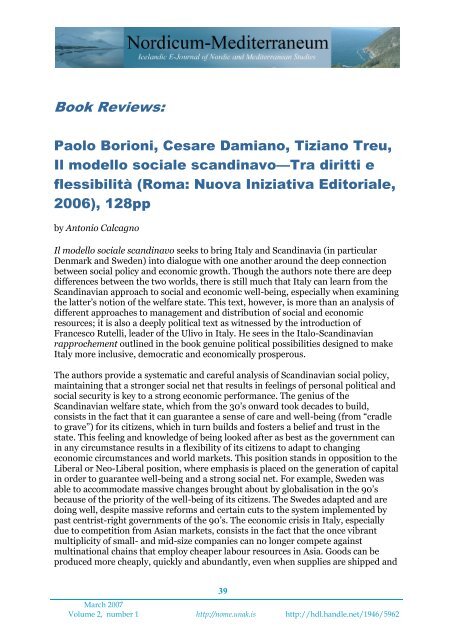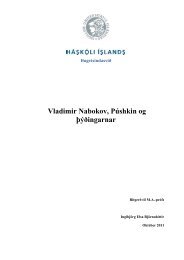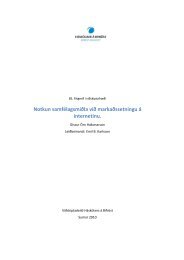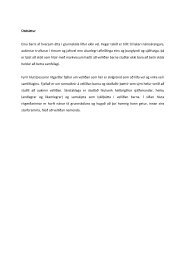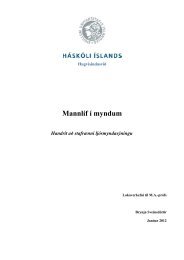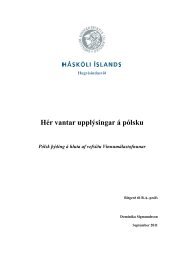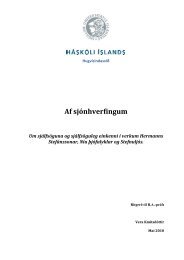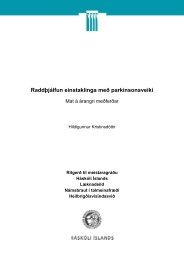The Birds by Tarjei Vesaas and The Heron by Giorgio ... - Skemman
The Birds by Tarjei Vesaas and The Heron by Giorgio ... - Skemman
The Birds by Tarjei Vesaas and The Heron by Giorgio ... - Skemman
Create successful ePaper yourself
Turn your PDF publications into a flip-book with our unique Google optimized e-Paper software.
Book Reviews:<br />
Paolo Borioni, Cesare Damiano, Tiziano Treu,<br />
Il modello sociale sc<strong>and</strong>inavo—Tra diritti e<br />
flessibilità (Roma: Nuova Iniziativa Editoriale,<br />
2006), 128pp<br />
<strong>by</strong> Antonio Calcagno<br />
Il modello sociale sc<strong>and</strong>inavo seeks to bring Italy <strong>and</strong> Sc<strong>and</strong>inavia (in particular<br />
Denmark <strong>and</strong> Sweden) into dialogue with one another around the deep connection<br />
between social policy <strong>and</strong> economic growth. Though the authors note there are deep<br />
differences between the two worlds, there is still much that Italy can learn from the<br />
Sc<strong>and</strong>inavian approach to social <strong>and</strong> economic well-being, especially when examining<br />
the latter‘s notion of the welfare state. This text, however, is more than an analysis of<br />
different approaches to management <strong>and</strong> distribution of social <strong>and</strong> economic<br />
resources; it is also a deeply political text as witnessed <strong>by</strong> the introduction of<br />
Francesco Rutelli, leader of the Ulivo in Italy. He sees in the Italo-Sc<strong>and</strong>inavian<br />
rapprochement outlined in the book genuine political possibilities designed to make<br />
Italy more inclusive, democratic <strong>and</strong> economically prosperous.<br />
<strong>The</strong> authors provide a systematic <strong>and</strong> careful analysis of Sc<strong>and</strong>inavian social policy,<br />
maintaining that a stronger social net that results in feelings of personal political <strong>and</strong><br />
social security is key to a strong economic performance. <strong>The</strong> genius of the<br />
Sc<strong>and</strong>inavian welfare state, which from the 30‘s onward took decades to build,<br />
consists in the fact that it can guarantee a sense of care <strong>and</strong> well-being (from ―cradle<br />
to grave‖) for its citizens, which in turn builds <strong>and</strong> fosters a belief <strong>and</strong> trust in the<br />
state. This feeling <strong>and</strong> knowledge of being looked after as best as the government can<br />
in any circumstance results in a flexibility of its citizens to adapt to changing<br />
economic circumstances <strong>and</strong> world markets. This position st<strong>and</strong>s in opposition to the<br />
Liberal or Neo-Liberal position, where emphasis is placed on the generation of capital<br />
in order to guarantee well-being <strong>and</strong> a strong social net. For example, Sweden was<br />
able to accommodate massive changes brought about <strong>by</strong> globalisation in the 90‘s<br />
because of the priority of the well-being of its citizens. <strong>The</strong> Swedes adapted <strong>and</strong> are<br />
doing well, despite massive reforms <strong>and</strong> certain cuts to the system implemented <strong>by</strong><br />
past centrist-right governments of the 90‘s. <strong>The</strong> economic crisis in Italy, especially<br />
due to competition from Asian markets, consists in the fact that the once vibrant<br />
multiplicity of small- <strong>and</strong> mid-size companies can no longer compete against<br />
multinational chains that employ cheaper labour resources in Asia. Goods can be<br />
produced more cheaply, quickly <strong>and</strong> abundantly, even when supplies are shipped <strong>and</strong><br />
March 2007<br />
Volume 2, number 1<br />
39<br />
http://nome.unak.is<br />
http://hdl.h<strong>and</strong>le.net/1946/5962
goods are shipped back to Italian <strong>and</strong> Western markets. <strong>The</strong> problem for Italy <strong>and</strong><br />
other countries like France <strong>and</strong> Germany is that their social net <strong>and</strong> the social wellbeing<br />
of their respective citizens is based on available funds generated from economic<br />
growth. When smaller companies can no longer compete, one‘s social well-being<br />
suffers from a lack of resources <strong>and</strong> institutional support.<br />
To this end <strong>and</strong> drawing from their study of Sc<strong>and</strong>inavian social <strong>and</strong> economic policy,<br />
the authors propose serious reforms in order to create a more solid <strong>and</strong> democratic<br />
social net analogous to that found in Sweden <strong>and</strong> Denmark. Among the numerous<br />
suggestions one finds reforming workers‘ rights <strong>and</strong> privileges when it comes to<br />
accessing certain social benefits in cases of unemployment, maternity, paternity, etc.<br />
Also, there is a push to give to companies extended periods of credit <strong>and</strong> funding in<br />
order to adapt to changing global economic pressures.<br />
Though most of the suggestions seems logical <strong>and</strong> desirable, one must take into<br />
account that the huge differences between Italy <strong>and</strong> Sc<strong>and</strong>inavia are such that it<br />
would be impossible, especially given history, regional differences, cultural <strong>and</strong><br />
political differences as well as the sheer difference in population numbers, to<br />
transplant certain Swedish or Danish policies into Italy without seriously<br />
undermining certain Italian regional <strong>and</strong> political differences. To conclude, <strong>and</strong><br />
despite my foregoing critique, the book is meant to provoke one to think <strong>and</strong><br />
seriously challenge the presupposition that economic prosperity is key for social wellbeing.<br />
In reversing this formula, much is given to think about.<br />
Antonio Calcagno is Assistant Professor of Philosophy at the University of Scranton.<br />
He is a specialist in contemporary European thought with an emphasis on Social<br />
<strong>and</strong> Political Philosophy. He has published various articles in this field.<br />
March 2007<br />
Volume 2, number 1<br />
40<br />
http://nome.unak.is<br />
http://hdl.h<strong>and</strong>le.net/1946/5962


